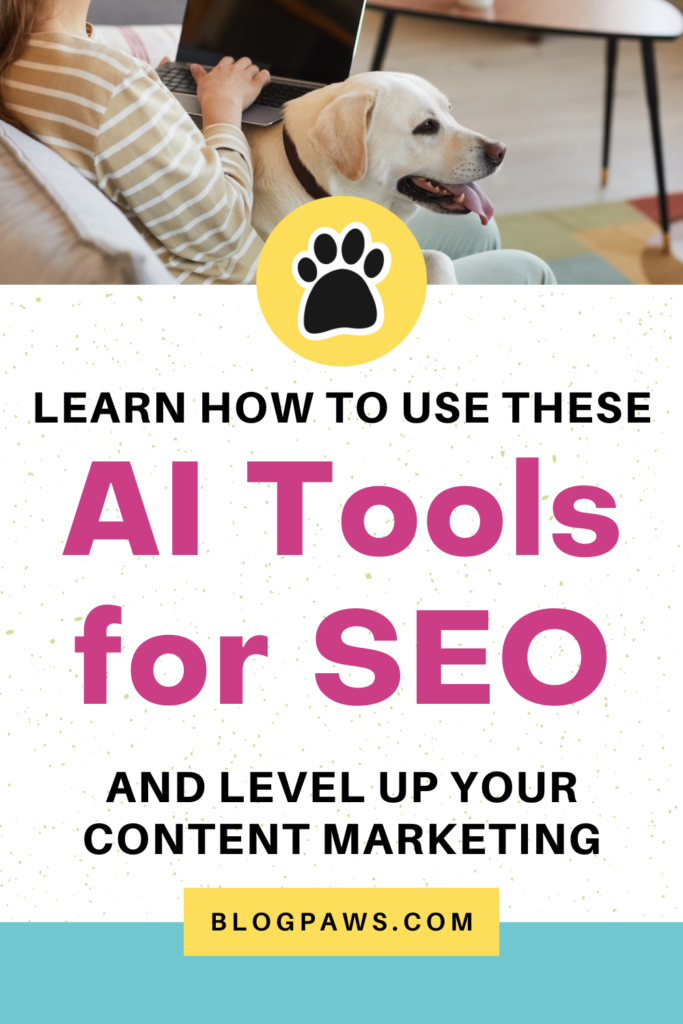Level Up Your Content Marketing with AI for SEO
Are you struggling to create SEO-friendly content that ranks high in search results for your small pet business? You’re not alone!
Between the recent updates (and upsets) relating to Google as a search platform and the introduction of AI into content creation, many small business owners are left feeling overwhelmed and unable to cope.
At the same time, the importance of content in your marketing plan hasn’t changed. This includes creating content and finding a way for that content to reach your ideal customer.
Luckily, the introduction of AI into the world of marketing isn’t all doom and gloom. In fact, this valuable tool, when used correctly, can help you take your content marketing to the next level.
This guide will dig into the best ways to use AI in your content creation process, from keyword research and topic identification to competitor analysis and content strategy. Plus, we’ll discuss why we believe AI will never be a replacement for human content writing.
Let’s get started…
What is AI?
Before we dive into the use of AI for SEO and content marketing, let’s take a step back. What exactly is AI, and how does it impact the marketing world?
AI, or Artificial Intelligence, refers to the use of machine learning and technology to automate different elements of the content creation process. There are four key areas within the content marketing world where this is used, including:
- Content creation (written content, images, audio, and video)
- Content optimization (including for search engines and other platforms)
- Content Promotion (getting your content in front of the right eyes)
- Performance Analysis (gathering and analyzing data about your content performance)
Unfortunately, with the introduction of AI tools, we have seen many in the content marketing world jump instantly into ways it can be used to eliminate as much work as possible at the cost of quality content. We’ve all seen poorly written AI articles that hardly even make sense to read!
However, using an AI tool to mass-produce hundreds of poor-quality articles isn’t the only way to leverage this technology.
You may even be using AI already without realizing it…
How Search Engines Themselves Use AI
One common misconception in the world of AI and SEO is that some platforms are completely against the use of AI and penalize content that is identified as AI-generated.
The truth is that it doesn’t really matter how you create content as long as the end result is high-quality and valuable to your reader.
Many search engines have been using AI tools and elements in their algorithms for quite some time. These tools collect data from both content published online to determine whether it should be shared in their search results and data from users to better understand their browsing behavior and/or purchase history and deliver the best content for their unique needs.
Recognizing that it plays such an essential role in the function of these platforms, it’s easy to see that they aren’t going to write off the possible benefits these tools offer.
Will AI Replace SEO and Content Creation?
This is where much of the fearmongering and hesitation to use AI-powered SEO and content creation tools comes into play. With new technological advancements, are we simply being replaced?
We can’t say there will never be a day when AI can create and market quality content. However, the tools available today aren’t “there yet.” They are far from creating content that won’t require a human touch.
Just look at the many AI-generated disasters already circulating the internet, from photos of people with eight fingers on one hand to content that would fail a grade 4 writing class.
While it can replace some parts of our process, there will always need to be a human at the wheel running the process, fact-checking, editing, and ensuring the content being produced is of the caliber necessary to best represent your brand.
Content creators will never be replaced, but their roles may change and evolve with this technology.
8 Ways to Use AI for SEO Content Writing
Now that we’ve discussed what AI is and how it could impact the landscape of content marketing, let’s dive deeper into exactly how YOU could use the many available tools available to improve your content creation and inbound marketing.
Here are a few ways you can introduce AI tools into your small business:
Identifying User Intent and Search Trends
One of the most critical steps in the content creation process, if you want your content to be seen by your ideal customer, is to understand what search terms and keywords/phrases will allow you to reach them. This means understanding what they are searching for, why they are searching for it when they are searching for it, and what they hope to find.
For those who prefer, you can always use Google’s search platform and manually research these SEO elements. However, that process can take a lot of time – a valuable commodity in short supply for solopreneurs and small business owners.
Using AI tools to collect and assess this information is a great way to get answers quickly. These tools can analyze large volumes of data while you are busy focusing on other aspects of your business. Plus, their analysis is purely data-driven and allows you to avoid human error or bias.
Keyword Research & Keyword Strategy
This is arguably the use that most people are familiar with. AI tools can be used to identify the best keywords to target to reach your ideal customer, as well as different ways those keywords can be used within your content.
Most of the BlogPaws community already uses one of these AI-powered SEO keyword research tools, such as Semrush, KeySearch, or Google Keyword Planner. If you aren’t already doing this, consider trying a few different tools to experiment with your AI keyword research and discover which tools best fit your needs.
Idea Generation
Have you ever faced a complete creative block? We’ve all been there! There was a time when this struggle could completely derail and prevent your content creation efforts, but AI may offer just the solution you need.
Try using AI tools to help you generate different topic ideas around a keyword, potential topics for individual headings within an article, or new ways to spin a topic so you can create new and unique content to stand out in the SERPs.
Content Outlines & Briefs
We’ve previously discussed the benefits of using article briefs to plan your content for SEO on the blog. However, we also understand that we are all individuals and work differently. For some, creating these briefs and outlines may actually hold them back from creating the actual content.
After training an AI tool to understand your website and your typical approach to content, you can feed the tool information about a specific post you are working on and allow it to create the outline for you.
Content Creation & Optimization
Often, people struggle to understand the moral and ethical use of AI to create content. We do not recommend that you simply tell an AI tool to do the writing for you. However, these tools can help with the content creation process.
Many of the bigger SEO and keyword research tools include AI content optimization. This means that as YOU do the writing (in your tone and voice), the tool analyzes what you’re writing and offers recommendations. This includes which keywords to include and where to include them, specific headings or topics seen in high-performing content, and more.
These tools don’t replace you as the writer, but they do help you improve the likelihood that your content will rank on the most popular search platforms.
Competitor Analysis
While we believe strongly in collaboration over competition, understanding how your direct competitors use content in their marketing efforts is invaluable. This includes questions like:
- What topics have they covered? Do these topics highlight any content gaps on your site?
- What keywords or keyword phrases are they targeting?
- How is their content performing (traffic, engagement)?
- How many backlinks have they received to their content?
- How detailed are their posts? Are they 8000-word guides or short 800-word posts?
- What structure are they using in their content?
- Do they use images/graphics? If so, how many images are included?
- What tone are they using to resonate with their audience? Is their content more formal or more professional?
- Are they collaborating with other businesses or influencers? If so, how?
Taking the time to research each competitor manually is unrealistic for most small business owners. However, with the power of AI, you can collect and analyze this information to help drive your content marketing plan.
Finding Content Gaps
If you want to be seen as an authority on a specific topic, creating content that thoroughly covers the different aspects of that topic to showcase your knowledge is key. For example, if you sell supplements for senior dog mobility, you will gain the trust of potential customers by showing that you are an expert on all things related to senior dogs and their joint health.
With the help of AI, you can review and analyze what topics are already covered on your website and which topics may be missing. This could include big topics covered by competitors already or even topics missing in general and uncovered by the industry.
Content Repurposing
Creating content is A LOT of work. If you’ve just spent 2 hours writing a blog post, sitting down to create assets for your social media platforms and emails for your community may not be a realistic expectation. We understand!
One way many content creators can use AI is to repurpose content. For example, they can take a long-form blog post and break it down into bite-sized pieces to share on social media.
The Best AI Tools for SEO (Free and Paid)
Have you identified some new ways to use AI for SEO in your business? If so, the next step is finding a tool to perform your desired task(s). There are many AI tools on the market, each with strengths and weaknesses. For this reason, there is no “one-size-fits-all” solution.
A tool that works well for one person may not fit the needs or workflow of another. And that’s okay!
You may need to do some trial and error to find which tools work best for you. If something doesn’t feel quite “right,” don’t take it as a failure. It means you may need to explore something else or approach it differently.
Keep in mind that most of these tools need to be trained (like a dog)! You may not see the best results when you first use them. Give yourself time to train the tool and to learn how to best use it before making a final decision.
Some of the most recommended AI SEO tools include:
- ChatGPT
- Google Gemini
- Semrush
- Ahrefs
- KeySearch
- Scalenut
- Rankiq
- Narrato
- Twinword Ideas
- Surfer SEO
- Frase
- NeuralText
- ClickUp
- NeuronWriter
- INK
- Bramework
- OutRanking
- Perplexity AI
- Google Keyword Planner
Final Thoughts: AI and SEO
Most of the conversation revolving around the use of AI for SEO currently hinges on the question: Will AI replace SEO professionals and content creators? The short answer is No, not anytime soon. But it can be an excellent tool for helping you with content marketing efforts.
When using AI in SEO, consider the tasks that can be automated without taking away the human touch that will set your content apart. This includes parts of the content creation journey like ideation, keyword research, content optimization, competitor analysis and content repurposing. By using AI to assist with these tasks, you can free up your time to create high-quality content that is clearly written for people by people, which is the ultimate goal!
Do you currently use any AI tools for SEO in your small pet business? If so, which tools do you currently find to be the most valuable?
About the Author: Britt Kascjak, BlogPaws Director of Content & SEO, is an award-winning freelance writer whose background in digital and social media marketing spans 15+ years. She’s been a content creator in the pet industry for 9+ years with her own blogs: Shed Happens, The Kas Pack, and Lucifer the Rescue Pup where she shares her life and outdoor adventures with her 2 dogs and 3 cats. Read more…






